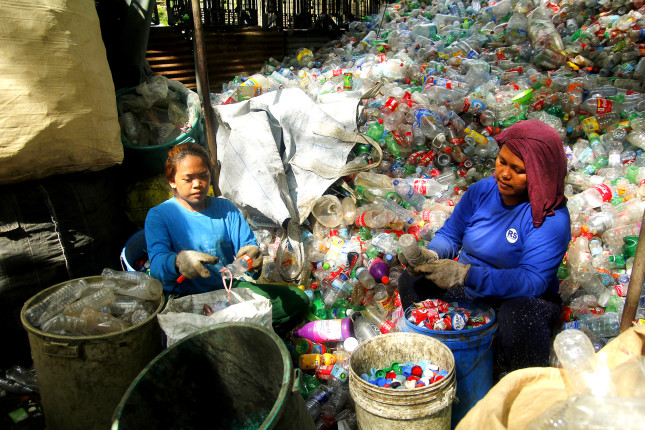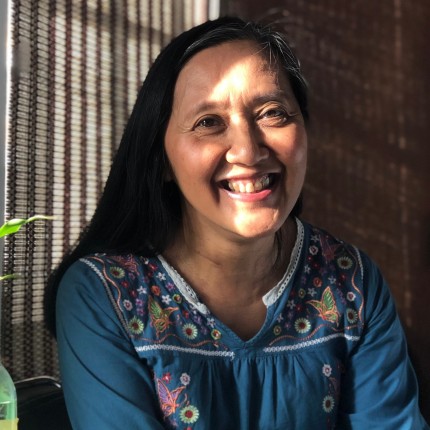-
Building Local Capacity for Zero-Waste in the Philippines: Q&A with Break Free From Plastic’s Former Asia-Pacific Coordinator Beau Baconguis

Large pollution can come in small packages. This is the case with the small plastic pouches, called sachets, that constitute a major source of the plastic waste crisis plaguing the Philippines, a country ranked third in the world for ocean plastic leakage. Filipino consumers throw away a staggering 163 million of these difficult-to-recycle plastic packets each day, which adds up to about 60 billion a year, enough to carpet 130,000 soccer fields.
For twenty years, Beau Baconguis has worked on toxic chemical pollution, plastic waste, and environmental and social justice issues in the Philippines. Beau got her start at the environmental conservation group, Haribon Foundation, where she worked to pass the Ecological Solid Waste Management Act of 2000, groundbreaking national legislation that established a formal waste collection system in the Philippines. The law instituted a nationwide ban on the incineration of solid waste and mandated the establishment of materials recovery facilities (MRFs) throughout the country. However, in the decades since, the law has been crippled by uneven implementation in each locality and the failure of the National Solid Waste Commission to utilize all of its enforcement powers. In 2018, despite the promise of this initial legislation, up to 74 percent of the plastic waste collected in the Philippines was still dumped into the ocean.
Prior to her retirement in 2020, Beau served as the Asia Pacific Coordinator at Break Free from Plastic (BFFP) and the Asia Pacific Plastics Campaigner at the Global Alliance for Incinerator Alternatives (GAIA). We sat down with her to discuss her inspiration to become an environmental activist and what comes next.
China Environment Forum (CEF): What has been the emphasis of your work to prevent plastic leakage and promote a circular economy in the Philippines? And how has your focus evolved over time?
Beau Baconguis (BB): Packaging with sachets is the biggest issue we have, although we didn’t see this at the start. A lot of the work grassroots groups do is focused on plastic bags, but we at BFFP started doing brand audits in 2016 and realized how serious the sachet problem is. Then GAIA came out with the two reports on sachets which solidified our resolve to really work on sachets.
Right now, action is initiated by grassroots organizations and small businesses in communities. The Plastics industry has very strong representation in the National Solid Waste Commission and has been, in our view, influential in blocking policies that limit the use of plastic. Promisingly, the National Solid Waste Commission produced a draft resolution in early 2021, twenty years after its initial deadline, to ban two forms of single-use plastic items: plastic straws and stirrers, but not plastic bags.
BFFP’s campaign is geared toward getting the corporations to change the way they package materials. In our surveys, people recognize that [plastic pollution] is a problem, but they don’t know what to do about it. People sometimes have no choice: if they want a product but can only get it in sachets or plastic, they will still buy it.
CEF: What have been the biggest challenges you’ve faced and how have you learned from them?
BB: The biggest challenge is that each local government unit will have a different way of implementing policies—or will have a different openness to types of policies or their implementation. However today, there are more than 30 local governments in the Philippines working toward becoming “zero waste” communities and over 10 cities and provinces that have already enacted some form of ban on single-use plastics. It took 20 years, but there is some movement.
We know there is a problem with the recycling system at the moment, especially now with COVID-19. PET plastic has the highest recyclability, but small islands [in the Philippines], don’t have a way of collecting and transporting PET bottles. The recycling system needs to be improved, but to us, it is critical for companies to choose the right materials to package their products in and to avoid plastics in upstream production as much as possible.
CEF: What does the future hold for your work?
BB: With the zero waste work that BFFP and other organizations have been doing, I am hopeful that we will see change in the coming years. We just need to be able to document it. Thus, one of the thrusts of BFFP’s campaign is building the capacity for its members to be able to tell their own stories.
CEF: Is there someone who informed your career, who you think of as a hero?
BB: I think the reason I “stuck” with environmental work is my first NGO job when I was a science researcher for the environmental conservation group, Haribon Foundation. I worked with a woman, an environmental lawyer. She was very passionate, very easy to work with, and always fun. She is still my very good friend.
When I was lobbying for the Clean Air Act, we worked with so many women. It was really the women who did the lobbying work. Especially the women we called the “perfumed ladies”—mostly well-heeled ladies who had the energy and the time to get involved in environmental work. We got them to do the lobby work because these were the people they were socializing with, and they were very effective!
This blog is part of the Closed Loop Innovator Series which profiles stories of women around the world innovating in business, civil society, and science to reduce plastic waste pollution. A condensed version will appear in the upcoming China Environment Forum publication, InsightOut: Closing the Loop on Plastic Waste in Indonesia.
Ruyi Li is a researcher at Wilson Center’s China Environment Forum. Her recent focuses are waste management in Asia and carbon neutrality trajectory in the US and China. She graduated from Johns Hopkins University (SAIS) with an MA in Energy, Resources & Environment and International Economics.
Clare Auld-Brokish was a spring 2020-2021 research assistant at the Wilson Center’s China Environment Forum where she was working on urban water issues in China and global plastic waste. She returned in 2020 from a Fulbright fellowship in Yunnan, China where she conducted environmental science research on freshwater lakes and constructed wetlands.
Sources: Break Free From Plastic, Esquire, Global Alliance for Incinerator Alternatives, Gma News, Inquirer.net, Republic of the Philippines-Department of Environment and Natural Resources, Republic of the Philippines-Department of Health, Reuters, Senate of the Philippines, University of Kitakyushu, and WWF
Lead Photo Credit: Workers of a materials recovery facility sort through plastic waste and segregate them for proper recycling in the Philippines, courtesy of Junpinzon/Shutterstock.com.
 A Publication of the Stimson Center.
A Publication of the Stimson Center.







